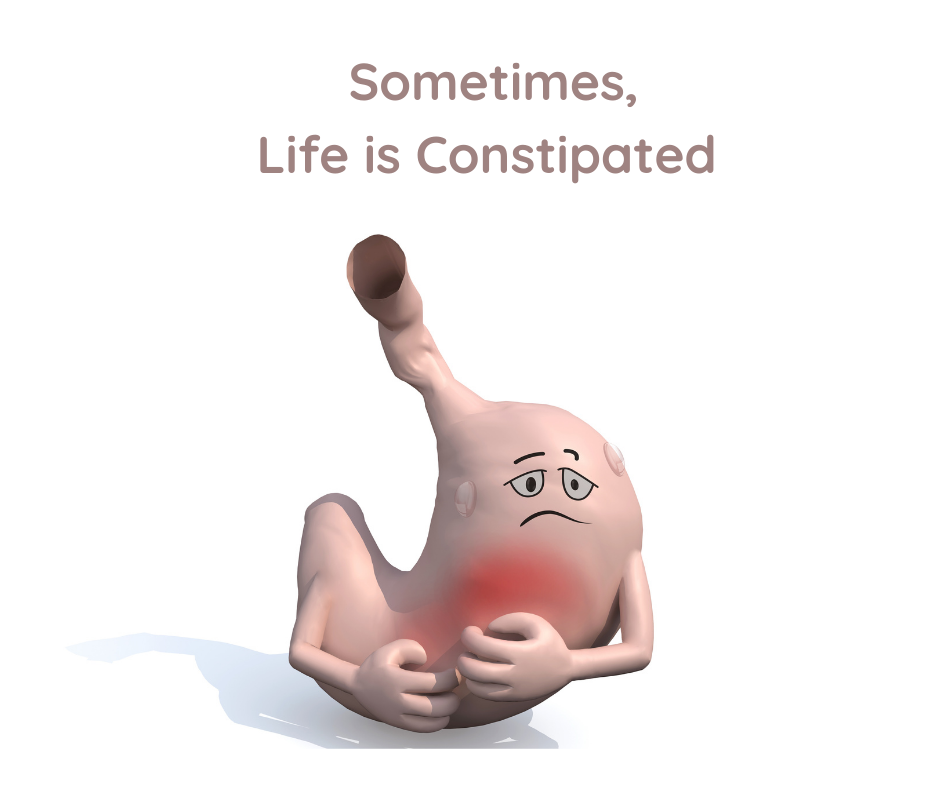Sometimes, life is constipated.
Did you know that in North America alone, over 63 million people are affected by chronic constipation?

If you had a happy poop this morning, consider yourself lucky!
Some people think if they don’t have a bowel movement every day, they are constipated — while that’s not true. According to many doctors, constipation symptoms include having two or fewer bowel movements in a week, even though Traditional Chinese Medicine and Ayurveda practitioners disagree. Other constipation symptoms are lumpy or hard stools, straining bowel movements, and feeling blocked or not wholly empty even after having a bowel movement.
Blockage or nerve issues in the colon or rectum are the leading causes of constipation. However, lifestyle choices and diet can increase the severity of the symptoms of chronic constipation.
The irregular bowel has become such an epidemic in recent years that Americans spend over $725 million annually on over-the-counter laxatives.
Outrageous, right?
But the good news is there are things you can do at home to get relief without taking any laxatives.

Check Your Diet and Lifestyle to Unblock Yourself
A recent survey shows that chronic constipation affects 16 percent of Americans and a third of those older than 60. Constipation affects people of all ages, especially young children and the elderly. The most common causes include a poorly maintained diet (lack of fibre), not drinking enough water, lack of exercise or physical activity, and high-stress levels. Keep your diet and lifestyle in check as what you eat, and your activity level can lead to constipation.
Here are three simple things you can do to unblock yourself.
Introduce More Fibre to Your Diet
One of the most common causes of constipation is the lack of fibre in your diet. Increase the amount of dietary and prebiotic fibre in your diet. Dietary fibre has two types: soluble and insoluble. Soluble fibres slow digestion and helps your body absorb the nutrients better, whereas insoluble fibre draws water into your stool and adds bulk. In combination, they help the stool to pass quickly through the intestine.
Prebiotic fibres fuel the probiotics in your gut, improving digestion, regularity and bowel movements. Lack of prebiotic fibres in your diet causes constipation, poor digestion, and bloating as your body cannot support your gut microbiome without them.
Hydrate Yourself
It’s a no-brainer that we should hydrate our body — but did you know dehydration is one of the leading causes of constipation?
Focus on building healthy habits and tracking your fluid intake throughout the day. Avoid alcohol and caffeinated drinks as they tend to dehydrate the body. Drinking warm liquids, especially in the morning, is helpful for some people to relieve themselves. When you increase the fibre in your diet, water demand also increases to process them.
Exercise and Sleep
Physical activity increases muscle activity in your intestine and promotes improved digestion. You don’t need to work out intensely to treat your constipation — simply going for a walk can help your stool to pass quickly.
Getting good quality sleep is essential for maintaining good digestive health. Side sleeping is another simple yet effective tool to treat constipation.

A Spoonful of happiGut for A Happy Poop
With our current fast-paced lifestyle, many of us struggle to meet the recommended 25-30g of fibre intake, and that’s where happiGut can help. happiGut is heaven sent when it comes to preventing that unpleasant irregularity. Our happiGut whole food prebiotic fibre is a perfectly balanced combination of soluble and insoluble fibres. It improves gut health and helps to get closer to your daily fibre requirements while improving microbiome diversity. The naturally-derived fibre supplement delivers the fibre equivalent of 2 servings (166 g) of fruits and vegetables without the sugar.
happiGut helps you treat constipation by giving your gut the fibre boost it needs. Starting with 1 tsp daily and building to 2 teaspoons twice a day to the beverage of your choice will help you get to be more regular, manage and reduce bloat and help you get on with your day. For sensitive gut, start with a half teaspoon and work your way up to a standard serving.
Do you have any questions regarding your gut health? Comment below and let us know!


No Comments
Be the first to start a conversation